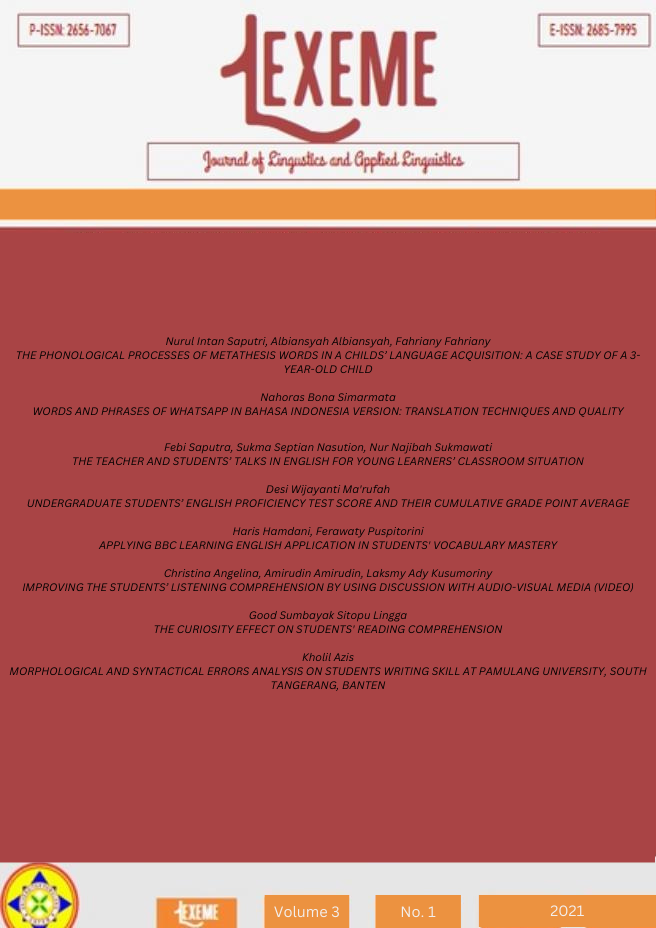THE CURIOSITY EFFECT ON STUDENTS' READING COMPREHENSION
DOI:
https://doi.org/10.32493/ljlal.v3i1.15658Keywords:
curiosity, reading comprehension, studentsAbstract
The purpose of this study was to find out whether curriculum has a significant effect on students' reading comprehension or not. This study uses a quantitative ex post facto method. The research instrument used consisted of tests and questionnaires which were distributed to the sample. The population in this study were students of class X from SMA NEGERI 1 BANGUN PURBA (200 students) and the sample of this study was 60 students. The researcher took the sample using proportional stratified sampling technique, in which the sample was divided into three groups proportionally: high, medium, and low curiosity. The results of this study indicate that curriculum has a significant effect on reading comprehension of students in class X. It is shown from the average score of students with high curriculum (83.5) which has a higher score than the average score of students with low curiosity (60). It is also shown from the results of statistical calculations that the value of tp (7.150) > tt (2.086) at the significance level (α = 0.05). From these calculations, the alternative hypothesis is accepted and the null hypothesis is rejected.
References
Akhtar, S. (2019). Silent Virtues – Patience, Curiosity, Privacy, Intimacy, Humility, and Dignity. London and New York: Routledge.
Arikunto, S. (2014). Prosedur Penelitian, Suatu Pendekatan Praktik. Jakarta: PT Rineka Cipta.
Ary, D et al. (2010). Introduction to Research in Education 8th Edition. Wadsworth: Cengage Learning.
Clarke, P. J et al. (2014). Developing Reading Comprehension. Chichester: Wiley-Blackwell.
Creswell, J. W et al. (2014). Research Design: Qualitative, Quantitative, and Mixed Method Approaches 4th Edition. Thousand Oaks: Sage Publications, Inc.
Dharmaraj. W. (2015). Learning and Teaching. Tiruchirappali: Bharathidasan University.
Haggard, M. (2018). The Duality of Interest and Deprivation: An Account of Curiosity in Psychology. London and New York: Rowman & Littlefield International Ltd.
Irmawati, R. (2014). The Correlation between Curiosity and Reading Comprehension in Learning English at MTs Darul Hikmah Pekanbaru [thesis]. Pekanbaru: State Islamic University Sultan Syarif Kasim of Riau.
Isikman, E et al. (2016). The Effects of Curiosity-Evoking Events on Activity Enjoyment. Journal of Experimental Psychology: Applied, 22 (3), 319-330.
Kemendiknas. (2010). Pengembangan Pendidikan Budaya dan Karakter Bangsa. Jakarta: Badan Penelitian dan Pengembangan Pusat Kurikulum.
Kidd, C., dan Hayden B. Y. (2015). The Psychology and Neuroscience of Curiosity. Neuron, 88 (3), 449-460.
Livio, M. (2017). Why? What Makes Us Curious. New York: Simon & Schuster.
Oudeyer, P.-Y., Gottlieb, J., & Lopes, M. (2016). Intrinsic Motivation, Curiosity, and Learning: Theory and Applications in Educational Technologies. Progress in Brain Research, 229 (11), 257-284.
Rahma, D. N. (2019). An Analysis of Reading Comprehension Questions Made by English Teacher at SMAN 2 Sidoarjo Based on Barret’s Taxonomy [thesis]. Surabaya: State Islamic University of Sunan Ampel Surabaya.
Rowson, J et al. (2012). The Power of Curiosity: How Linking Inquisitiveness to Innovation Could Help to Address Our Energy Challenges. RSA Social Brain Center, 1, 1-36.
Sari, D. P. (2016). An Analysis of Students’ Reading Comprehension Based on The Four Levels Comprehension Skills (A Study at The Second Year Students of SMAN 10 Bengkulu Academic Year 2014/2015). Linguists: Journal of Linguistics and Language Teaching, 3 (1), 1-20.
Solikhah, N. (2017). Improving Student’s Reading Comprehension Ability Using Collaborative Strategic Reading (CSR) at the Eighth Grade Students of MTs Ma’arif Bakung Udanawu Blitar [thesis]. Tulungagung: State Islamic Institute of Tulungagung.
Sudjana. (2005). Metoda Statistika. Bandung: Tarsito.
Sugiyono. (2018). Metode Penelitian Kuantitatif. Bandung: Alfabeta.
Wylie, J et al. (2018). Cognitive Process and Digital Reading. Amsterdam and Philadelphia: John Benjamins Publishing Company.







